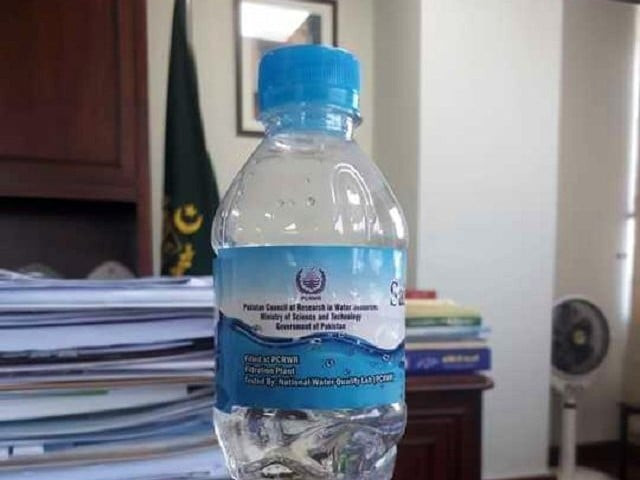Hollow on the inside: How a promise evaporated like water
PCRWR chairman says he had discussed ‘filtered' water with then science minister

In August 2019, then federal science and technology minister Fawad Chaudhry had introduced the first locally-manufactured bottled mineral water costing Re1 per litre.
Around 1.5 years later, the project aiming to provide bottled water at an unbelievably low rate has yet to see the light of day.
Back then, Fawad, who is now the information minister, had made the announcement about the Pakistan Council of Research in Water Resources (PCRWR) preparing “Safe Drinking Water”, which cost one rupee per litre.
He added that the low-cost bottled water would first be used at the Prime Minister Office, the President House, the Parliament House and the GHQ and then be provided to the public.
Read more: Govt launches its own mineral water to cut costs
“We have rolled out these water bottles for Re1 per litre. It is quality drinking water,” the minister was quoted as saying.
However in the ongoing month, it turned out that there was no actual plan on paper to market the bottled water for Re1 per litre and the idea was the outcome of a meeting between the former science minister and the PCRWR Chairman Dr Muhammad Ashraf.
The project had caught the attention of the public but it could not even make its place in the two-year performance report of the science ministry.
“How can you give water in one rupee per litre when the bottle itself costs Rs7?” Dr Ashraf said while talking to The Express Tribune at his office.
The PCRWR chairman cleared the air about the project, saying: “it wasn’t on paper; it was in his [Fawad] mind that youngsters would be given loans under Kamyab Jawan Programme to set up shops where they would sell filtered water at an appropriate price.”
Revealing how the project was envisaged, Dr Ashraf said the discussion that took place was about the cost of one litre of filtered water.
“The PCRWR had estimated that it [filtered water] would cost less than Re1 per litre,” he added.
“But the actual cost would depend on the quality of the water in a particular area.”
At that time, Dr Ashraf elaborated, it was planned that a filter plant would be installed in some area and residents would carry water in their own containers -- bowls, bottles or any other container.
“This way, the cost would have been less than a rupee; it was that simple,” he added.
Dr Ashraf said he was abroad when he started receiving calls from his office and the science ministry about the project after the minister issued the statement.
“I had clarified it; a half-litre bottle’s cost is Rs7; placing a label and cap sealing along with other things take its cost to 13 to 14 rupees,” he explained.
When reminded that Fawad’s statement had come along with photos of the bottle with the label of “Safe Drinking Water” prepared by PCRWR, Dr Ashraf said he had immediately brought the matter to the minister’s notice.
“Packing was started at that time for internal consumption only,” he clarified.
“We, as in an institution, discourage the use of a bottle; we use jugs and glasses at the PCRWR.”
While referring to a filter plant installed outside the PCRWR office and one in Mithi by the Sindh government that costs 23 paisa per gallon, Dr Ashraf said one litre of filtered water could still be provided in less than one rupee but without including the bottle.
“The water being provided through the plant at the PCRWR is free and better than the bottled one,” he maintained.
Dr Ashraf said a plant similar to the one installed at the PCRWR cost between Rs350,000 and Rs400,000 but the price could be as high as Rs2 million depending on the level of contamination in the water where it was being installed.
“We had respectfully informed the minister back then that we are a research institution and do monitoring. As per our mandate, we can’t be involved in any water-related business because it's a conflict of interest,” the PCRWR chairman said.
“The PCRWR is not a business-oriented organisation. Its job is to provide research and monitor the water companies,” he said.
“Providing water to the people is the job of the civic agencies and it is a provincial subject after the 18th amendment.”
Dr Ashraf said the basic concept all over the world -- also stated in the country's National Water Policy -- was to provide safe drinking water at home.
“Bottled water is carried only when one is travelling,” he added.
He proposed that if the government installed a water meter at every house, the consumer would be willing to pay as per the usage.
When asked about the project, Chaudhry said it was ready and people could apply for loans under Kamyab Jawan Programme to establish their businesses.
When reminded about the previous news reports that carried his statement along with a 500ml bottle, Chaudhry said the plan was to provide filtered water but not in bottles.
“The plan to set up filter plants can still be implemented and I will look into it,” he added.
He denied the notion that the project of providing water in bottles at Re1 per litre was dropped because of pressure from the companies selling them.



















COMMENTS
Comments are moderated and generally will be posted if they are on-topic and not abusive.
For more information, please see our Comments FAQ